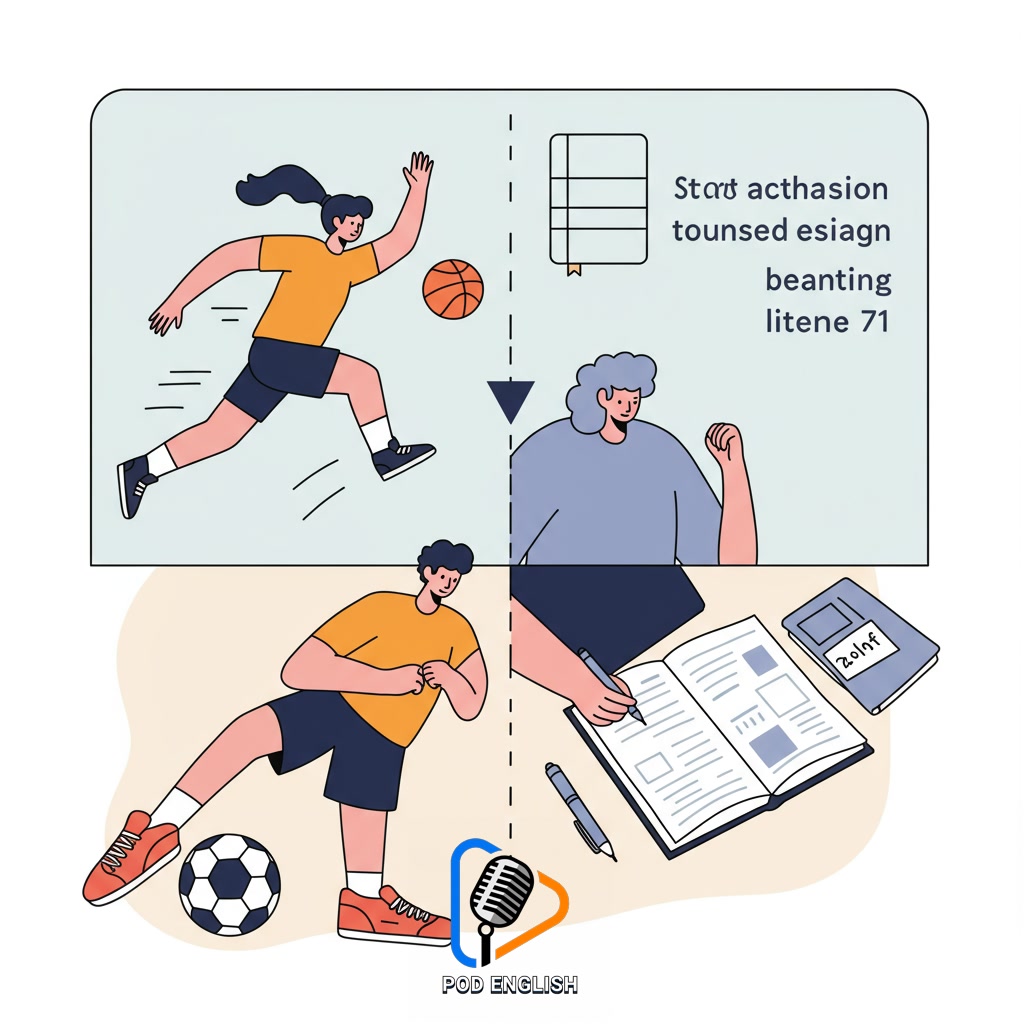Learn English
Boost English Study Focus & Time Management Through Sports

This content explores how engaging in sports can significantly enhance focus and time management skills, which are crucial for effective learning english. It will detail strategies for integrating physical activity into a study routine to improve concentration and optimize study schedules. Discover practical tips on leveraging the discipline and structure learned from sports to achieve better results in your english language acquisition journey.
Table of Contents
- Section 1: Introduction: The Challenge of Sustaining Focus in Learning English
- Section 2: The Mind-Body Connection: How Physical Activity Impacts Brain Function for Learning
- Section 3: Boosting Concentration: Using Sports to Sharpen Your Focus on English Study
- Section 4: Developing Discipline: Applying Time Management Skills from Sports to Learning
- Section 5: Practical Strategies: Integrating Exercise into Your English Study Routine
- Section 6: Beyond Focus: Additional Benefits of Sports for English Language Learners
- Section 7: Conclusion: Achieving a Balanced and Effective Approach to Learning English
Section 1: Introduction: The Challenge of Sustaining Focus in Learning English
Learning English effectively requires consistent effort and dedicated study time. However, many learners face a significant challenge: maintaining focus and managing their time efficiently. In today’s busy world, distractions are everywhere, from social media notifications to other responsibilities. Sitting down to study grammar rules, vocabulary, or practice speaking can feel overwhelming, and it’s easy for the mind to wander. Finding the discipline to start, stay on task, and allocate sufficient time for different aspects of language learning is a common hurdle. This lack of sustained focus and poor time management can slow down progress and make the learning journey feel frustrating. This introduction explores this common struggle before introducing a potential solution.

Introduction: The Challenge of Sustaining Focus in Learning English
Section 2: The Mind-Body Connection: How Physical Activity Impacts Brain Function for Learning
Building on the challenge of maintaining focus while learning English, it’s crucial to understand the powerful link between your physical state and cognitive abilities. Engaging in physical activity isn’t merely about staying fit; it has profound effects on your brain function, directly impacting your capacity for learning. When you exercise, your body increases blood flow to the brain, delivering more oxygen and nutrients essential for peak performance. Furthermore, physical activity stimulates the release of key chemicals like endorphins, which improve mood and reduce stress, and Brain-Derived Neurotrophic Factor (BDNF), often called “Miracle-Gro for the brain,” which supports the growth and repair of brain cells and enhances synaptic plasticity – the brain’s ability to form new connections. These physiological changes translate into improved concentration, enhanced memory retention, and better overall cognitive function, making your English study sessions more effective.

The Mind-Body Connection: How Physical Activity Impacts Brain Function for Learning
Section 3: Boosting Concentration: Using Sports to Sharpen Your Focus on English Study
Building on the powerful link between physical activity and cognitive abilities, sports offer a direct pathway to sharpening your focus for English study. Engaging in regular physical activity, like running or playing a team sport, significantly increases blood flow to the brain. This improved circulation provides essential oxygen and nutrients, which are vital for cognitive functions, including concentration and attention span. Furthermore, sports release endorphins, natural mood elevators that reduce stress and anxiety – major distractions when trying to learn. The discipline required in sports, such as focusing on the game, a technique, or a strategy, trains your brain to filter out irrelevant stimuli and maintain attention on the task at hand. This mental discipline, honed on the field or track, directly translates to your study desk, helping you concentrate more effectively on challenging English grammar rules, complex reading passages, or listening exercises.

Boosting Concentration: Using Sports to Sharpen Your Focus on English Study
Section 4: Developing Discipline: Applying Time Management Skills from Sports to Learning
Building on the focus gains from physical activity discussed previously, sports inherently teach invaluable lessons in discipline and time management. Adhering to practice schedules, managing training alongside other commitments, and pushing through demanding sessions all cultivate a strong sense of routine and perseverance. When you apply this structured approach to your English learning, you naturally become better at setting specific study times, allocating sufficient time for different skills like grammar, vocabulary, or speaking practice, and resisting distractions. The commitment required for sports mirrors the consistency needed to master a new language. By consciously transferring the organizational skills developed on the field or court to your study desk, you create an effective framework for consistent and productive English language acquisition.

Developing Discipline: Applying Time Management Skills from Sports to Learning
Section 5: Practical Strategies: Integrating Exercise into Your English Study Routine
Integrating physical activity into your English study routine doesn’t have to be complicated. Start by scheduling short exercise breaks, perhaps 10-15 minutes of stretching or walking, between study sessions to refresh your mind and improve concentration. Consider listening to English language podcasts or audiobooks during your commute or while doing light exercises like cycling or jogging. Plan your study blocks around your training schedule, ensuring you allocate dedicated time for both. Use a planner to visualize how exercise fits alongside your English lessons and practice sessions, reinforcing the time management skills learned in sports. This structured approach helps maintain focus and prevents burnout, making your English learning journey more effective and sustainable.

Practical Strategies: Integrating Exercise into Your English Study Routine
Section 6: Beyond Focus: Additional Benefits of Sports for English Language Learners
While improved focus and time management are significant advantages, sports offer further benefits crucial for English language learners. Engaging in physical activity is a powerful stress reducer, which is vital as learning a new language can sometimes feel overwhelming. Reduced stress levels improve cognitive function, memory retention, and overall motivation. Furthermore, participating in team sports or group fitness can provide valuable social interaction opportunities. Practicing English in a relaxed, non-classroom setting with peers can boost confidence and fluency. The discipline and perseverance learned on the field or court also translate directly to study habits, encouraging learners to stick to their language goals even when facing challenges. These combined effects create a more positive and effective learning environment.

Beyond Focus: Additional Benefits of Sports for English Language Learners
Section 7: Conclusion: Achieving a Balanced and Effective Approach to Learning English
In conclusion, integrating sports into your routine offers powerful benefits for English language learning. As we’ve seen, engaging in physical activity not only sharpens focus and improves time management but also significantly reduces stress, creating an optimal state for absorbing new information. By consciously applying the discipline and structure learned on the field or court to your study habits, you can build a more efficient and effective learning schedule. The key lies in finding a sustainable balance that allows you to leverage the physical and mental advantages of sports to achieve your English proficiency goals. Embrace this holistic approach for a more productive and enjoyable learning journey.

Conclusion: Achieving a Balanced and Effective Approach to Learning English













